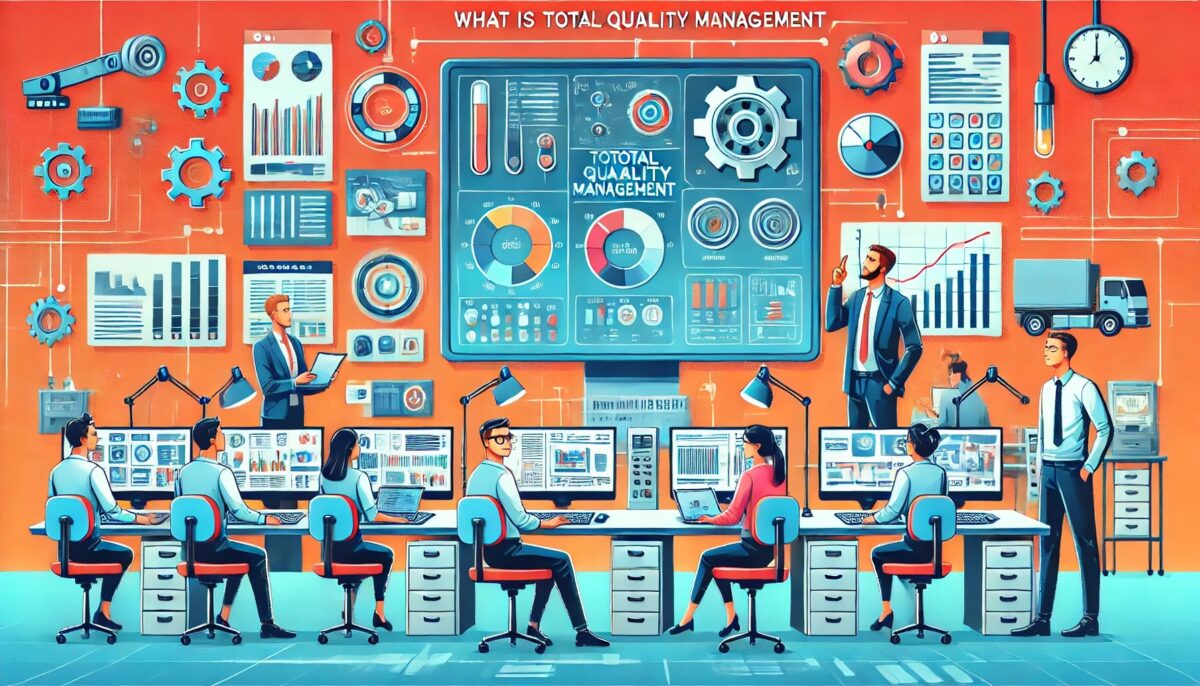Introduction
In the competitive landscape of modern business, achieving and maintaining high-quality standards is not just desirable but essential for long-term success. Total Quality Management (TQM) emerges as a comprehensive approach aimed at enhancing quality across all facets of an organization. Rooted in continuous improvement and customer satisfaction, TQM has evolved into a strategic philosophy embraced by businesses worldwide, including in India.
Understanding Total Quality Management
Total Quality Management (TQM) is a management approach that emphasizes the importance of quality in all aspects of organizational activities. It goes beyond traditional quality control measures by involving every employee, from top management to frontline workers, in the pursuit of quality excellence. TQM is built on several key principles:
Customer Focus:
TQM places utmost importance on understanding and meeting customer expectations. By aligning products and services with customer needs, organizations can enhance satisfaction and loyalty.
Continuous Improvement:
Also known as Kaizen, continuous improvement is at the heart of TQM. It involves ongoing efforts to enhance processes, products, and services incrementally, aiming for perfection over time.
Employee Involvement:
TQM emphasizes that quality is everyone’s responsibility. Engaging employees in quality improvement initiatives fosters a culture of ownership and empowerment.
Process Approach:
TQM advocates for systematic management and improvement of processes rather than isolated corrective actions. This approach ensures consistency and efficiency in delivering quality outcomes.
Fact-based Decision Making:
TQM promotes data-driven decision-making processes. By relying on statistical analysis and measurable indicators, organizations can make informed choices to drive quality improvements.
The Evolution of TQM in India
In India, the adoption of Total Quality Management gained prominence with the economic liberalization reforms of the 1990s. As businesses opened up to global competition, the need to enhance quality and operational efficiency became imperative. Organizations across various sectors, including manufacturing, services, and healthcare, began integrating TQM principles into their management practices.
Key Elements of TQM Implementation
Successful implementation of Total Quality Management involves several key elements:
Leadership Commitment:
Top management plays a crucial role in championing TQM initiatives, setting quality goals, and allocating resources to support continuous improvement efforts.
Employee Training and Development:
Providing adequate training and development opportunities equips employees with the skills and knowledge to contribute effectively to quality improvement initiatives.
Customer Feedback and Engagement:
Regularly gathering customer feedback and involving customers in product/service design processes helps organizations align their offerings with market demands.
Benchmarking and Best Practices:
Benchmarking against industry leaders and adopting best practices enables organizations to identify areas for improvement and implement effective quality strategies.
Benefits of Total Quality Management
Implementing Total Quality Management yields numerous benefits for organizations:
Improved Productivity and Efficiency:
Streamlined processes and reduced waste contribute to higher productivity and operational efficiency.
Enhanced Customer Satisfaction:
By consistently delivering high-quality products and services, organizations can build strong customer relationships and loyalty.
Cost Savings:
TQM reduces rework, defects, and other inefficiencies, leading to cost savings over time.
Competitive Advantage:
Organizations that excel in quality management gain a competitive edge in the marketplace, attracting more customers and opportunities.
Challenges in Implementing TQM
While TQM offers substantial benefits, its implementation poses challenges:
Resistance to Change:
Cultural resistance within organizations may hinder the adoption of new quality management practices.
Resource Constraints:
Allocating sufficient resources, including time and budget, for TQM initiatives can be challenging, especially for small and medium enterprises.
Measuring Impact:
Quantifying the direct impact of TQM on business performance metrics can be complex, requiring robust performance measurement systems.
Case Studies of TQM Success in India
Several Indian organizations have achieved notable success through Total Quality Management:
Tata Group:
Known for its commitment to quality and innovation, Tata Group incorporates TQM principles across its diverse portfolio of companies.
Infosys:
The IT giant has embraced TQM to enhance service delivery and client satisfaction, positioning itself as a global leader in software services.
Apollo Hospitals:
Apollo Hospitals leverages TQM to deliver superior healthcare services, focusing on patient safety and clinical outcomes.
Future Trends in Total Quality Management
Looking ahead, Total Quality Management is expected to evolve in response to technological advancements and changing market dynamics. Key future trends include:
Digital Transformation:
Integration of digital technologies such as AI and IoT to enhance quality monitoring and predictive maintenance.
Sustainability:
Emphasis on sustainable practices and environmental stewardship as integral components of TQM.
Agile Quality Management:
Adoption of agile methodologies to quickly respond to changing customer preferences and market demands.
Conclusion
Total Quality Management represents a holistic approach to achieving excellence in quality, customer satisfaction, and operational efficiency. In the Indian context, TQM has played a pivotal role in transforming organizations across various sectors, driving competitiveness and sustainable growth. By embracing TQM principles and adapting them to local realities, businesses in India can navigate challenges, seize opportunities, and thrive in an increasingly dynamic global economy. As organizations continue to prioritize quality as a strategic imperative, Total Quality Management remains indispensable in shaping a future where excellence is not just a goal but a fundamental pillar of business success.








